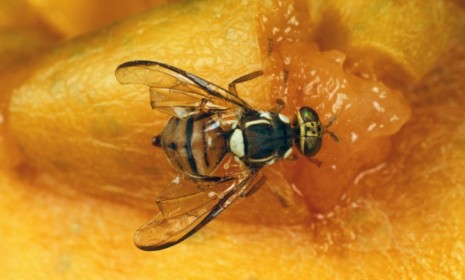Do fruit flies use alcohol to cope with sexual rejection?
New research finds that dejected male flies seek booze when rejected by the ladies. The findings could help humans fight addiction more successfully

Love got you down? You're not alone. New research finds that the tiny male fruit fly, when rejected by a flirty female bug, sometimes drowns his sorrow in booze. Here, a look at the study:
So the bugs are sad?
Not exactly. A chronically sex-deprived fruit fly experiences a decrease in a brain chemical called neuropeptide F (NPF) which may play a role in the bug's internal reward system. Eating food or finding a mate — activities that increase the fly's survival odds — both help boost a bug's NPF levels. In the absence of female interaction, an external stimulus like alcohol does the same thing.
The Week
Escape your echo chamber. Get the facts behind the news, plus analysis from multiple perspectives.

Sign up for The Week's Free Newsletters
From our morning news briefing to a weekly Good News Newsletter, get the best of The Week delivered directly to your inbox.
From our morning news briefing to a weekly Good News Newsletter, get the best of The Week delivered directly to your inbox.
Where do the flies find alcohol?
Typically in the yeast of rotting fruit.
How was the experiment conducted?
In this study, published in the journal Science, researchers locked a bunch of "eager Lotharios" in with a female fly that had just mated and, colloquially speaking, wasn't interested in sex. According to the Associated Press, the female would run away or kick overly aggressive males to keep them at bay. After being exposed to hour-long sessions of such abuse three times over the course of four days, dejected male flies were isolated in vials and given a choice between regular food or alcohol. They chose to get "plastered."
A free daily email with the biggest news stories of the day – and the best features from TheWeek.com
What about male flies that weren't rejected?
Just the opposite happened. In a reverse experiment, after a male fruit fly mingled with a receptive female, its "yen for alcohol declined," says the AP.
How does this help humans?
Researchers conduct these studies to better understand alcoholism and develop better treatments. A similar chemical called neuropeptide Y (NPY) helps monitor reward-related behavior in human brains. Our body's reward-systems are "very sensitive to stress," Dr. George Koob of the Scripps Research Institute tells The New York Times. For example: "After you lose a loved one, or a relationship has crashed, or you get dysphoric, your NPY goes down, and this provides a strong urge to drink a lot," he says, "whether you're a mammal or a fruit fly."
Sources: Associated Press, LiveScience, The New York Times
-
 Will SpaceX, OpenAI and Anthropic make 2026 the year of mega tech listings?
Will SpaceX, OpenAI and Anthropic make 2026 the year of mega tech listings?In Depth SpaceX float may come as soon as this year, and would be the largest IPO in history
-
 Reforming the House of Lords
Reforming the House of LordsThe Explainer Keir Starmer’s government regards reform of the House of Lords as ‘long overdue and essential’
-
 Sudoku: February 2026
Sudoku: February 2026Puzzles The daily medium sudoku puzzle from The Week